Mango benefits extend far beyond their delectable taste. Often hailed as the ‘king of fruits,’ mangoes, scientifically known as Mangifera indica, have been cherished for centuries in their native South Asia. With their sweet and juicy flesh, vibrant color, and distinctive flavor, mangoes have won the hearts of fruit enthusiasts worldwide. Yet, what truly sets mangoes apart are the multitude of health advantages they bring, all backed by scientific research.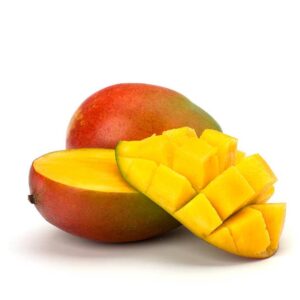
Rich in Vitamins and Minerals:
Mangoes are a rich source of essential vitamins and minerals, particularly vitamin C, vitamin A, and potassium. Vitamin C is crucial for immune function, collagen production, and skin health, while vitamin A plays a vital role in maintaining vision and skin integrity. Potassium, on the other hand, helps regulate blood pressure and supports proper muscle and nerve function.
Reference: Dreher, M. L., & Davenport, A. J. (2013). Hass avocado composition and potential health effects. Critical Reviews in Food Science and Nutrition, 53(7), 738-750.
High in Dietary Fiber
Mangoes are an excellent source of dietary fiber, which aids in digestion, helps prevent constipation, and promotes a feeling of fullness, aiding in weight management. Fiber also plays a role in regulating blood sugar levels and lowering the risk of heart disease.
Moreover, the fiber content in mangoes consists of both soluble and insoluble fibers. Soluble fiber contributes to the feeling of fullness and helps control blood sugar levels by slowing down the absorption of sugars.
On the other hand, insoluble fiber adds bulk to the stool, promoting regular bowel movements and supporting a healthy digestive system. The unique combination of these fiber types in mangoes makes them a versatile fruit, not only delicious but also an excellent choice for maintaining overall digestive wellness
Reference: Anderson, J. W., Baird, P., Davis Jr, R. H., Ferreri, S., Knudtson, M., Koraym, A., … & Williams, C. L. (2009). Health benefits of dietary fiber. Nutrition reviews, 67(4), 188-205.
Antioxidant Properties
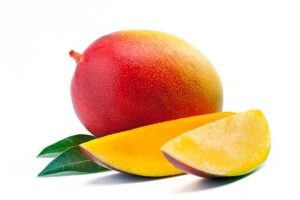 Mangoes are rich in antioxidants, such as quercetin, beta-carotene, and various polyphenolic compounds, which help combat oxidative stress in the body. These antioxidants may reduce the risk of chronic diseases, including cancer and heart disease, by neutralizing harmful free radicals.
Mangoes are rich in antioxidants, such as quercetin, beta-carotene, and various polyphenolic compounds, which help combat oxidative stress in the body. These antioxidants may reduce the risk of chronic diseases, including cancer and heart disease, by neutralizing harmful free radicals.
Additionally, the unique combination of antioxidants found in mangoes contributes to their anti-inflammatory properties. Studies have shown that regular consumption of mangoes may help alleviate inflammation in the body, potentially providing relief for conditions such as arthritis. The synergistic effects of quercetin, beta-carotene, and other polyphenols present in mangoes make them a flavorful and nutritious addition to a diet aimed at promoting overall health and well-being
Reference: Rice-Evans, C. A., Miller, N. J., & Paganga, G. (1996). Structure-antioxidant activity relationships of flavonoids and phenolic acids. Free Radical Biology and Medicine, 20(7), 933-956.
Anti-Inflammatory Effects
Research suggests that mango consumption may have anti-inflammatory effects due to the presence of bioactive compounds like mangiferin and quercetin. These compounds may help alleviate symptoms of inflammatory conditions and joint pain.
Moreover, the unique composition of bioactive compounds in mangoes contributes to their potent anti-inflammatory properties. Mangiferin, a flavonoid abundant in mangoes, has been linked to the inhibition of inflammatory pathways, offering a natural and delicious way to potentially mitigate inflammation. Additionally, quercetin, another powerful antioxidant found in mangoes, not only combats inflammation but also exhibits synergistic effects, further enhancing the fruit’s anti-inflammatory potential.
Reference: Muruganandan, S., Gupta, S., Kataria, M., & Lal, J. (2002). Mangiferin protects the streptozotocin-induced oxidative damage to cardiac and renal tissues in rats. Toxicology, 176(3), 165-173.
Potential Cancer Protection
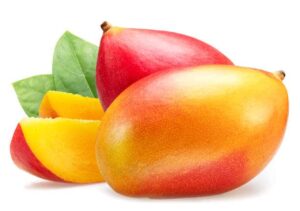 Some studies have shown that mangoes contain compounds with potential anticancer properties. These compounds, including beta-carotene and polyphenols, may help inhibit the growth of cancer cells and reduce the risk of certain cancers, such as colon and breast cancer.
Some studies have shown that mangoes contain compounds with potential anticancer properties. These compounds, including beta-carotene and polyphenols, may help inhibit the growth of cancer cells and reduce the risk of certain cancers, such as colon and breast cancer.
Moreover, mangoes stand out as a rich source of mangiferin, a bioactive compound recognized for its potential in cancer prevention. Mangiferin has been studied for its antioxidant and anti-inflammatory properties, demonstrating an ability to combat oxidative stress and inflammation—both factors associated with cancer development. The synergistic effects of beta-carotene, polyphenols, and mangiferin make mangoes a flavorful and promising addition to a cancer-preventive diet.
Reference: Saiko, P., Szakmary, A., Jaeger, W., & Szekeres, T. (2008). Resveratrol and its analogs: defense against cancer, coronary disease and neurodegenerative maladies or just a fad? Mutation Research/Fundamental and Molecular Mechanisms of Mutagenesis, 658(1-2), 68-94.
Improved Digestive Health
Mangoes contain enzymes like amylases, which aid in breaking down complex carbohydrates, making digestion more efficient. Additionally, mangoes are known for their high water content, which can help prevent dehydration and promote regular bowel movements, further contributing to digestive health.
Moreover, the fiber content in mangoes plays a crucial role in maintaining a healthy digestive system. The combination of soluble and insoluble fiber not only helps prevent constipation but also supports the growth of beneficial gut bacteria, fostering a balanced gut microbiome.
Mangoes are also rich in digestive enzymes, such as proteases, which assist in the breakdown of proteins and contribute to overall digestive comfort. Including mangoes in your diet can be a flavorful and nutritious way to promote optimal digestive well-being.
Reference: Gupta, R. K., & Gupta, R. K. (2006). Antinutritional and toxic factors in food legumes: A review. Plant Foods for Human Nutrition, 61(1), 1-22.
Skin and Hair Benefits
The vitamins and antioxidants in mangoes contribute to healthy, radiant skin. Vitamin A, in particular, helps maintain skin integrity and may reduce the appearance of fine lines and wrinkles. The fruit’s high water content also keeps your skin hydrated. Moreover, mango seed oil is used in cosmetic products for its moisturizing and emollient properties.
Furthermore, mangoes are rich in vitamin C, which plays a crucial role in collagen synthesis, promoting skin elasticity and firmness. The antioxidants present in mangoes, including beta-carotene, help combat oxidative stress, reducing the risk of premature aging.
Additionally, the unique combination of nutrients in mangoes supports hair health, with vitamin E contributing to a lustrous shine and preventing hair damage. Incorporating mangoes into your diet not only nurtures your skin from within but also offers a natural and indulgent approach to enhancing your overall beauty regimen.
Reference: Pappas, A., Johnsen, S., Liu, J. C., & Eisinger, M. (2016). Sebum analysis of individuals with and without acne. Dermato-Endocrinology, 8(1), e1264916.
Eye Health
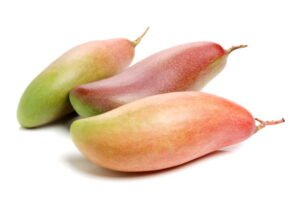 Mangoes are a great source of beta-carotene, which the body converts into vitamin A. Vitamin A is essential for maintaining good eyesight and may help prevent age-related macular degeneration and other vision problems.
Mangoes are a great source of beta-carotene, which the body converts into vitamin A. Vitamin A is essential for maintaining good eyesight and may help prevent age-related macular degeneration and other vision problems.
In addition to beta-carotene, mangoes contain zeaxanthin, lutein, and vitamin C, all of which contribute to optimal eye health. Zeaxanthin and lutein are carotenoids that accumulate in the retina and are associated with a reduced risk of cataracts and macular degeneration.
Reference: Bähr, M., & Fechner, A. (2017). Age-related macular degeneration: The importance of micronutrients. Ophthalmology and Therapy, 6(1), 5-16.
Alkalizing the Body
Mangoes have an alkalizing effect on the body due to their rich supply of minerals like potassium and magnesium. An alkaline environment can help counteract the effects of an overly acidic diet and potentially reduce the risk of chronic diseases associated with acidity.
Moreover, the unique compounds found in mangoes, such as quercetin, isoquercitrin, and astragalin, contribute to their alkalizing properties. These compounds not only support the body’s pH balance but also exhibit anti-inflammatory and antioxidant effects.
Reference: Schwalfenberg, G. K. (2011). The alkaline diet: Is there evidence that an alkaline pH diet benefits health? Journal of Environmental and Public Health, 2012.
Weight Management
Including mangoes in a balanced diet can aid in weight management. Their high fiber content, along with vitamins and minerals, supports overall health and may help control cravings for less healthy snack options.
Moreover, mangoes contain unique compounds such as mangiferin and quercetin, which have been linked to potential benefits for weight management. Mangiferin, known for its antioxidant properties, may play a role in reducing inflammation and improving insulin sensitivity. Quercetin, on the other hand, has been associated with enhanced metabolism and the breakdown of fats.
Reference: Tucker, L. A., & Thomas, K. S. (2009). Increasing total fiber intake reduces risk of weight and fat gains in women. The Journal of Nutrition, 139(3), 576-581.
Immune System Support
Mangoes are an excellent source of vitamin C, which is well-known for its immune-boosting properties. Regular consumption of mangoes can strengthen your immune system, making your body more resilient to infections and illnesses.
Furthermore, mangoes are rich in other essential nutrients such as beta-carotene, which the body converts into vitamin A. This combination of vitamin C and beta-carotene not only enhances immune function but also supports the health of mucous membranes, a crucial barrier against pathogens. The potent antioxidants present in mangoes contribute to reducing oxidative stress, further fortifying the immune system and promoting overall well-being.
Reference: Carr, A. C., & Maggini, S. (2017). Vitamin C and immune function. Nutrients, 9(11), 1211.
Bone Health
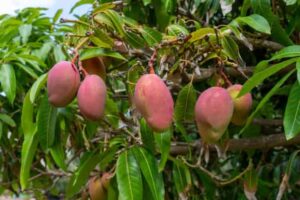 Mangoes are a good source of vitamin K, which is essential for bone health. Vitamin K plays a vital role in calcium absorption and bone mineralization, helping to maintain strong and healthy bones.
Mangoes are a good source of vitamin K, which is essential for bone health. Vitamin K plays a vital role in calcium absorption and bone mineralization, helping to maintain strong and healthy bones.
Additionally, mangoes boast a rich content of magnesium and potassium, two crucial minerals for bone health. Magnesium is involved in the activation of vitamin D, further enhancing calcium absorption, while potassium helps in neutralizing acids that can leach calcium from the bones. The unique combination of these compounds in mangoes contributes not only to the structural integrity of bones but also supports overall bone density, making them a delightful addition to a bone-healthy diet.
Reference: Maresz, K. (2015). Proper calcium use: vitamin K2 as a promoter of bone and cardiovascular health. Integrative Medicine: A Clinician’s Journal, 14(1), 34.
Hydration and Electrolyte Balance
Mangoes have a high water content, which can help keep you hydrated, especially in hot weather or after physical activity. The fruit also contains electrolytes like potassium and magnesium, which are essential for maintaining proper fluid balance in the body.
Moreover, mangoes offer a natural source of sugars, including fructose and glucose, which can be beneficial for replenishing energy levels during dehydration. The unique combination of water, electrolytes, and sugars in mangoes makes them a refreshing and nourishing choice for rehydration.
Additionally, the fiber content in mangoes contributes to sustained hydration by aiding in digestion and the gradual release of fluids into the body, further enhancing their role in promoting optimal hydration and electrolyte balance.
Reference: Shirreffs, S. M. (2003). Hydration: special issues for playing football in warm and hot environments. Scandinavian Journal of Medicine & Science in Sports, 13(6), 324-329.
Alleviation of Asthma Symptoms
Some studies suggest that mangoes may help reduce the severity of asthma symptoms. This potential benefit is attributed to the presence of beta-carotene and other antioxidants in mangoes, which have anti-inflammatory properties.
Moreover, mangoes contain a significant amount of vitamin C, another potent antioxidant known for its anti-inflammatory effects. This vitamin, along with the beta-carotene, may contribute to the overall respiratory health of individuals with asthma.
Additionally, the presence of quercetin, a flavonoid in mangoes, has been associated with improved lung function and reduced inflammation, further supporting the potential role of mangoes in alleviating asthma symptoms.
Reference: Wood, L. G., Garg, M. L., & Gibson, P. G. (2010). A high-fat challenge increases airway inflammation and impairs bronchodilator recovery in asthma. Journal of Allergy and Clinical Immunology, 125(6), 1396-1398.
Mental Well-being
Mangoes contain vitamin B6, which is essential for brain health. Vitamin B6 plays a role in the production of neurotransmitters like serotonin and dopamine, which are associated with mood regulation. Including mangoes in your diet may contribute to improved mental well-being.
Moreover, mangoes are a rich source of antioxidants, such as beta-carotene and vitamin C, known for their neuroprotective properties. These compounds help combat oxidative stress in the brain, potentially reducing the risk of cognitive decline.
Additionally, the natural sugars in mangoes provide a quick energy boost, enhancing alertness and focus. The synergistic combination of vitamin B6 and antioxidants in mangoes makes them a delicious and wholesome addition to support not only mood regulation but also overall cognitive function and mental clarity.
Reference: Kennedy, D. O. (2016). B vitamins and the brain: mechanisms, dose and efficacy—a review. Nutrients, 8(2), 68.
Nutritional Value of Mango (per 100 grams):
- Calories: Approximately 60 kcal
- Carbohydrates: Approximately 15 grams
- Sugars: Approximately 14 grams
- Dietary Fiber: Approximately 1.6 grams
- Protein: Approximately 0.82 grams
- Fat: Approximately 0.38 grams
- Saturated Fat: Approximately 0.092 grams
- Monounsaturated Fat: Approximately 0.092 grams
- Polyunsaturated Fat: Approximately 0.092 grams
Vitamins:
- Vitamin A: Approximately 54 micrograms (7% of the Daily Value)
- Vitamin C: Approximately 36.4 milligrams (60% of the Daily Value)
- Vitamin E: Approximately 0.9 milligrams (4% of the Daily Value)
- Vitamin K: Approximately 4.2 micrograms (6% of the Daily Value)
- Vitamin B6 (Pyridoxine): Approximately 0.112 milligrams (6% of the Daily Value)
- Folate (Vitamin B9): Approximately 43 micrograms (11% of the Daily Value)
Minerals:
- Potassium: Approximately 168 milligrams (5% of the Daily Value)
- Copper: Approximately 0.092 milligrams (4% of the Daily Value)
- Manganese: Approximately 0.063 milligrams (3% of the Daily Value)
- Magnesium: Approximately 11 milligrams (3% of the Daily Value)
- Calcium: Approximately 11 milligrams (1% of the Daily Value)
- Iron: Approximately 0.16 milligrams (1% of the Daily Value)
Phytonutrients and Antioxidants:
- Beta-Carotene: Approximately 54 micrograms
- Alpha-Carotene: Approximately 2 micrograms
- Lutein and Zeaxanthin: Approximately 11 micrograms
Please note that these values can vary slightly based on the ripeness and variety of the mango. Mangoes are a rich source of vitamins, particularly vitamin C and vitamin A, as well as dietary fiber and various antioxidants. They are also relatively low in calories and fat, making them a nutritious and delicious addition to a balanced diet.
Conclusion
Incorporating mangoes into your diet can provide a wide range of health benefits, supported by scientific evidence. Whether you enjoy them fresh, in smoothies, or as part of savory dishes, mangoes offer a delicious way to boost your nutrient intake and promote overall well-being. Remember that moderation is key, as excessive consumption of any food can lead to unwanted effects. So, go ahead and savor the sweetness of mangoes while reaping their many health rewards.
 If you’re looking for a delightful and refreshing dessert that celebrates the vibrant flavors of mango, Jamie Oliver’s Mango Yoghurt Layer Pots recipe is a must-try. This tantalizing dessert showcases the sweet and tropical essence of mangoes, combined with creamy yoghurt and a touch of honey for a luscious treat that’s perfect for any occasion.
If you’re looking for a delightful and refreshing dessert that celebrates the vibrant flavors of mango, Jamie Oliver’s Mango Yoghurt Layer Pots recipe is a must-try. This tantalizing dessert showcases the sweet and tropical essence of mangoes, combined with creamy yoghurt and a touch of honey for a luscious treat that’s perfect for any occasion.
Contraindications for Mango Consumption:
While mangoes are generally considered safe and beneficial for most people, there are a few contraindications and considerations to keep in mind:
Allergies:
Some individuals may be allergic to mangoes. Allergic reactions can range from mild symptoms like itching and hives to more severe reactions, including anaphylaxis. If you have a known mango allergy, it is essential to avoid mango consumption completely.
Latex Allergy:
People with latex allergies may experience cross-reactivity with mangoes, as they contain proteins similar to those found in latex. This can lead to allergic reactions in some individuals. If you have a latex allergy, consult a healthcare professional before consuming mangoes.
Oral Allergy Syndrome:
Some individuals with pollen allergies, such as birch pollen allergies, may experience mild oral allergy syndrome symptoms, like itching or tingling in the mouth, when consuming raw mangoes. Cooking or heating mangoes can often alleviate these symptoms.
Diabetes:
While mangoes are a nutritious fruit, they are also relatively high in natural sugars. Individuals with diabetes should monitor their carbohydrate intake, including mango consumption, to manage blood sugar levels effectively. It’s advisable to consult with a healthcare provider or a registered dietitian for personalized dietary recommendations.
Gastrointestinal Sensitivity:
In some cases, consuming large quantities of mangoes or eating them when overly ripe may lead to digestive discomfort, such as diarrhea or upset stomach. Moderation and choosing ripe but not overly ripe mangoes can help mitigate this issue.
Interactions with Medications:
Mangoes contain compounds called furanocoumarins, which may interact with certain medications, particularly those that are metabolized by the CYP3A4 enzyme. If you are taking medications and have concerns about potential interactions, consult your healthcare provider.
It’s important to note that these contraindications are relatively rare, and mangoes are generally considered a safe and healthy fruit for most people. However, if you have specific health concerns or dietary restrictions, it’s advisable to seek guidance from a healthcare professional or registered dietitian before making mango consumption a regular part of your diet.
Fascinating Facts About Mango
Mango Tango:
In a peculiar twist, mangoes are part of the cashew family, Anacardiaceae. This family connection means that mangoes share distant relatives with pistachios, poison ivy, and, surprisingly, cashews. So, the next time you savor a mango, consider the nutty family ties.
Mango Morse Code:
In the 19th century, during the British rule in India, mangoes weren’t just a treat for the taste buds—they were also used to send secret messages. As a form of botanical espionage, mangoes with unique shapes or markings were selected to convey covert messages about troop movements and strategies.
Mango Mystique in Astrology:
In some cultures, mangoes are associated with astrological significance. The belief is that consuming mangoes during a particular season can bring prosperity and good fortune. This mystical connection has led to mangoes being considered not just a fruit but a harbinger of positive cosmic energies.
Mango in Space:
Mangoes have experienced zero gravity! In 1983, mango seeds were among the cargo on the space shuttle Challenger. The seeds traveled into space to study the effects of microgravity on plant growth. Mangoes, it seems, have also had their own cosmic adventure.
Mango Morphology Matters:
Mangoes exhibit an intriguing phenomenon called “somaclonal variation,” where a single mango seed can give rise to trees with diverse fruit characteristics. This genetic quirk means that even from the same parent tree, mangoes can vary widely in size, shape, and flavor, creating a fruity tapestry of diversity.
Mango’s Musical Influence:
The allure of mangoes extends to the world of music. In the Philippines, there’s a traditional folk song titled “Bahay Kubo,” which describes a simple rural life. Mangoes make a charming appearance in the lyrics, further emphasizing their cultural importance and the idyllic image they evoke.
Mango Madness in Guinness World Records:
The world of mangoes has its place in the Guinness World Records. In 2009, a group of mango enthusiasts in the Philippines set a record for the largest mango mosaic. The mosaic, comprising thousands of mangoes, showcased intricate designs and patterns, turning a simple fruit into a masterpiece.
Mango Butter Beauty Secret:
Derived from the kernel of the mango seed, mango butter is a skincare secret. Rich in fatty acids and antioxidants, mango butter is used in cosmetics and skincare products for its moisturizing and nourishing properties. Mangoes not only tantalize the taste buds but also pamper the skin.
Mango Mathematics:
Believe it or not, the seed inside a mango can be a mathematical marvel. The seed often adopts a shape known as a “polyembryonic” seed, which means it can sprout multiple plants. This mathematical anomaly within the seed adds a layer of complexity to the natural geometry of mango propagation.
Mango Magnetism:
Mangoes have a magnetic personality, quite literally. Some varieties of mangoes exhibit ferromagnetism, meaning they contain traces of iron. While it’s not enough to attract metal objects, the subtle magnetic quality adds a touch of mystery to the inner workings of this tropical fruit.
Mango’s Colorful Chromatics:
The vibrant hues of a mango’s skin can tell you more than just its ripeness. The color is indicative of the variety, with some mangoes boasting an array of shades from green to red to purple. This natural color palette turns mango shopping into a visually dynamic experience.
Mango Musicality:
In certain regions, mango trees are believed to be musical. The rustling of mango leaves in the wind is said to create a melodious tune, giving the mango tree a musical reputation in local folklore. This harmonious connection adds a poetic touch to the mango’s presence.
Mango’s Time-Traveling Ancestry:
Mangoes are not just a taste of the tropics; they carry a historical passport. The mango is believed to be one of the oldest cultivated fruits, with a lineage dating back over 4,000 years. Its journey through time adds an intriguing layer to the ancient allure of this delectable fruit.
Mango Messages in Art:
Mangoes have inspired artists beyond the realm of culinary creations. In Indian art, mango motifs are prevalent, symbolizing love, fertility, and prosperity. The intricate designs find their way into traditional paintings, sculptures, and even textiles, turning the mango into a cultural and artistic muse.
Mango’s Floral Fandango:
While we relish the succulent flesh of mangoes, their flowers have their own allure. Mango blossoms are not just fragrant; they also have a surprising gender division. There are male and hermaphroditic flowers on the mango tree, contributing to the intricate dance of pollination.
Mango Money Matters:
In some cultures, mangoes are not just a fruit; they are a form of currency. In certain regions of Southeast Asia, mangoes are considered a symbol of prosperity, and gifting a basket of ripe mangoes is akin to wishing wealth and abundance upon someone—a truly unique form of green currency.
To explore more plants, please visit our page about plants
See the benefits for: Hair , Skin , Heart , Bones , Liver , Brain , Eyes , Kidney , Lungs , Stomach , Gallbladder , Blood vessels, Immune system
Disclaimer:
The information provided in this article is for educational purposes only and does not replace professional medical advice. Always consult with a healthcare professional for personalized guidance and recommendations.
